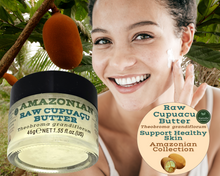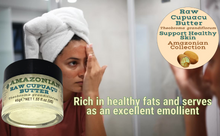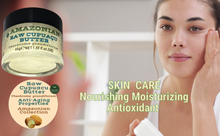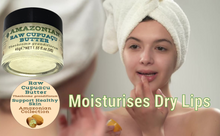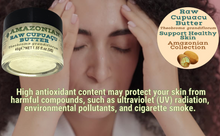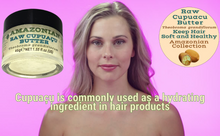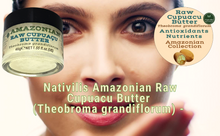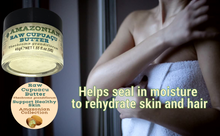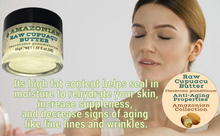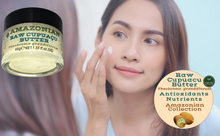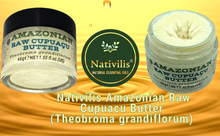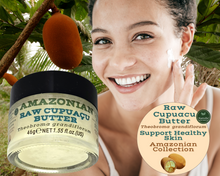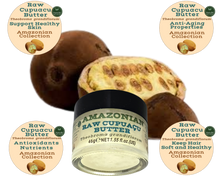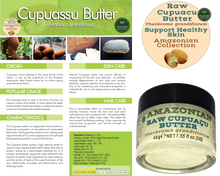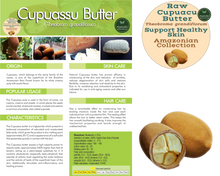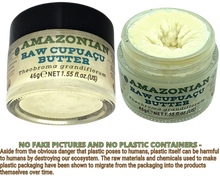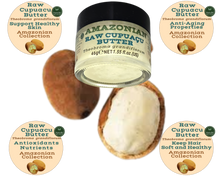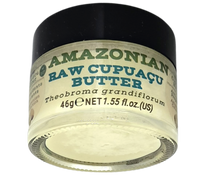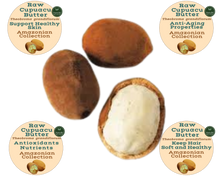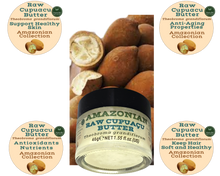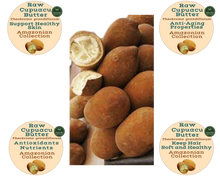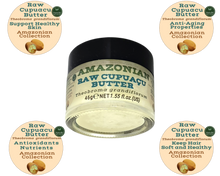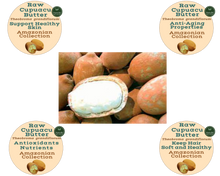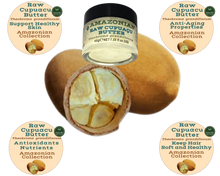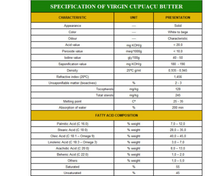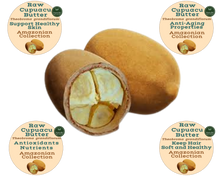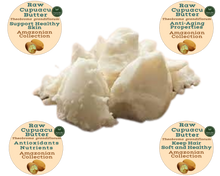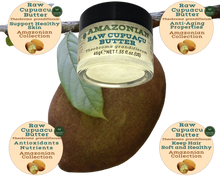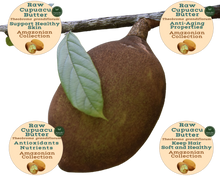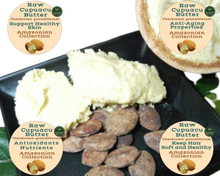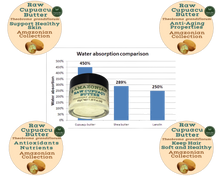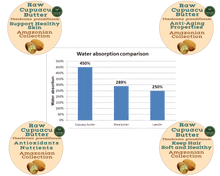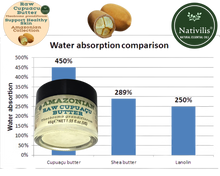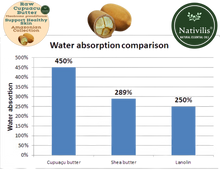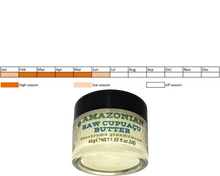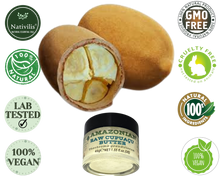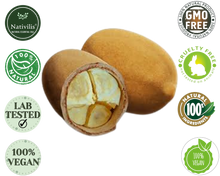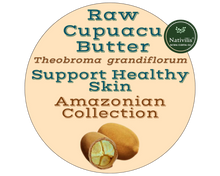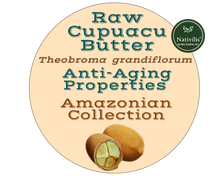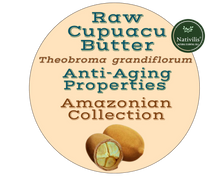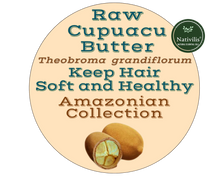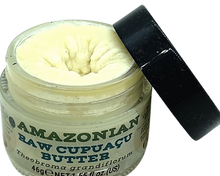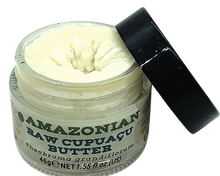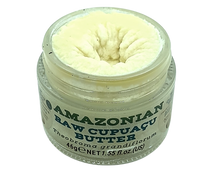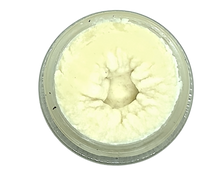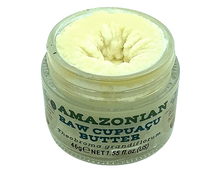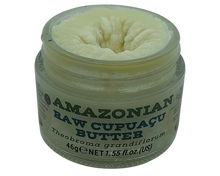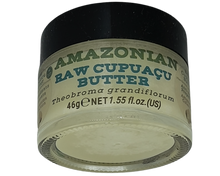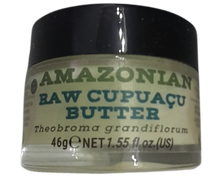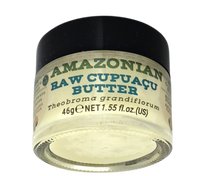

Nativilis Amazonian Raw Cupuacu Butter (Theobroma grandiflorum) - Helps seal in moisture to rehydrate skin and hair increase suppleness and decrease signs of aging like fine lines wrinkles – Copaiba
HARVEST PERIOD
CUPUAÇU BUTTER
Synonym: Cupuazu
CAS# 394239-67-9
PHYSICAL-CHEMICAL DATA AND APPLICATIONS
The cupuaçu butter (Theobroma grandiflorum) offers fantastic properties for the cosmetic industry. The cupuaçu butter is a triglyceride that presents a balanced composition of saturated and unsaturated fatty acids, which gives the product a low melting point (approximately 30 °C) and an appearance of a soft solid that penetrates quickly in contact with the skin. The cupuaçu butter possesses a high capacity power to absorb water, approximately 200% higher than that of lanolin, acting as a plant-based substitute for it (see below graphic). It contains phytosterols (especially beta-sitosterol) that operate at the cellular level regulating the water balance and the activity of lipids of the superficial layer of the skin. The high power of absorbing water of the cupuaçu butter can be attributed to the hydrogen bridges formed between the water molecules and phytosterols. Phytosterols have been used to treat dermatitis and disorders by stimulating the healing process.
POPULAR USAGE
Popularly, only the fruit pulp of cupuaçu is used for consumption, in the form of juices, ice creams, creams, and sweets. The removal of the pulp from the seeds is rather laborious and performed by scissors. In some regions the seeds are fermented, dried in the sun, roasted, ground in a mortar, and used as common chocolate, also called cupulate. In general, seeds are a byproduct of pulp processing and therefore underutilized and thrown away. With the growing interest of the pharmaceutical industry to get the butter of cupuaçu, the fruit pulp industries and cooperatives begin to separate and process the seeds in larger quantities.


ECOLOGY
The cupuaçu, native of the Amazon region, is a small tree with 4 to 8 meters (when cultivated) or up to 18 m high (as wild growing individuals in the native forest) and belongs to the same family of the cacao. The fruit is very large, cylinder-shaped with rounded ends, up to 30 cm in length with an average weight of 1.2 kilograms. At maturity, the fruits fall without the stalk when they start releasing the characteristic odor, which indicates the perfect ripening of them. The fruit contains a juicy and creamy pulp with characteristic flavor which is adhered to 20 to 30 large oval seeds. The butter of cupuaçu, similar to the “butter” of cacao, but with superior quality, is extracted from the seeds that contain approximately 45% of butter. The production in commercial plantations will begin from the 3rd year and reach an average of 12 fruits per tree. It is recommended the planting of 180 plants per hectare, which can produce 2148 fruits, representing 990 kg of pulp and 443 kg of seeds (an average the fruit is composed of 38.4% of pulp, 17.2% of seeds and 44.4% of skin). In general, with 1,000 kg of fresh seeds, 135 kg of butter from cupuaçu can be produced.
Potential benefits of cupuaçu
Cupuaçu and products made from it are becoming more commonplace in Western countries. The fruit and its butter are prized for their versatility in both food and beauty products.
In fact, cupuaçu may have a number of benefits.
May support healthy skin
Cupuaçu butter is rich in healthy fats and serves as an excellent emollient that may help restore your skin’s natural moisture barrier.
Due to its low melting point, cupuaçu butter softens when applied to the skin, allowing for quick absorption.
Its high fat content helps seal in moisture to rehydrate your skin, increase suppleness, and decrease signs of aging like fine lines and wrinkles.
Moreover, its high antioxidant content may protect your skin from harmful compounds, such as ultraviolet (UV) radiation, environmental pollutants, and cigarette smoke.
Keep in mind that you may tolerate cupuaçu butter differently depending on your skin type. For example, if you have oily skin, opt for using it only on drier body parts, such as your hands, feet, and elbows.
May keep your hair soft and healthy
Cupuaçu is commonly used as a hydrating ingredient in hair products.
Dry hair results from a lack of moisture in the hair shaft, which can lead to damaged, dull, or frizzy hair.
Cupuaçu is rich in both saturated and monounsaturated fatty acids, which have been shown to penetrate the hair shaft and restore hydration.
One study treated dyed hair samples with either cupuaçu butter, argan oil or a traditional conditioner. Both the cupuaçu and argan products significantly restored hair hydration and curbed protein loss — a common result of dying hair.
Rich in antioxidants and numerous nutrients
Cupuaçu is rich in antioxidants and nutrients that may benefit your health.
Its flavonoid antioxidants fight oxidative stress, high levels of which are linked to inflammation, obesity, and many other chronic conditions.

SUMMARY
Cupuaçu butter is rich in fats that contribute to healthy hair and skin. What’s more, its fruit is a great source of antioxidants and fiber.
Cosmetics
Given its hydrating and moisturizing properties, cupuaçu is added to many cosmetics. These include:
- body butters
- skin lotions
- soaps
- shampoos
- conditioners
- hair masks
- lip balms
Most cupuaçu products contain other ingredients, such as:
- shea butter
- argan oil
- other plant oils
They may likewise include:
- fragrances
- alcohols
- surfactants
- other ingredients
SUMMARY
Cupuaçu can be founded in an array of cosmetic products, including body butters and soaps. Furthermore, its powder is an alternative to cocoa powder.
The bottom line
Cupuaçu is a widely used in skin and hair products due to its high fat content, which can help moisturize your skin and hair.
-
Name: Nativilis Amazonian Raw Cupuacu Butter (Theobroma grandiflorum) - Helps seal in moisture to rehydrate skin and hair increase suppleness and decrease signs of aging like fine lines wrinkles – Copaiba
-
Scientific name: Theobroma grandiflorum
- Source of Raw Material: Amazonian Rainforest - Brazil
- Batch Number: AMO 003 - 007/082021
- Part Used of the plant: Seed
- Extraction Date: 22/09/2021
- Production Process: Cold extraction
- Number of analysis: 274/2021
- Preservatives: Absent
- Shelf life: 24 Months Solvent
- Extraction: Absent
- Traceability: Guaranteed
- Origin of the Vegetable Ingredients: Agroforestry systems
- Country of Origin: Brazil
-
Appearance: Solid
-
Approximate Melting Point: 33°C (91.4°F)
- Major Compounds: Oleic acid was identified as the principal constituent of the Cupuaçu seed extract, comprising 41.81% of the extracted content. The second main constituent is stearic acid (35.79%), followed by palmitic acid (8.67%), (See the Certification of Analysis)
-
SAFETY HEALTH: Product harmless, for cosmetic use only. Not suitable for human consumption.
- STORAGE: Should be stored tightly sealed, protected from light and heat.
-
Directions for use:
- Open the container of Nativilis Amazonian Raw Cupuacu Butter so that it is ready for application.
- Wash your hands very well with soap and water, for a couple of minutes.
- Dip one finger into the Cocoa Butter, take some, and apply in your face/ hair and body.
- Rinse fingers again before closing jar.
- Remember not to put your fingers back into glass jar after touching any other surface.
- In summary , Nativilis Amazonian Raw Cupuacu Butter is VERY CONCENTRATED and 100% PURE , so if you want to enrich any other product you need only 3 teaspoon (tsp) Nativilis Amazonian Raw Cupuacu Butter and it is capable to enrich 300ml of any other natural product for Face, Hair and Body , so 1 teaspoon for each 100ml)
- Note: 1ml = 25 drops / 1 teaspoon (tsp) = 5 grams = 5ml.
- This is a hard butter that can be needed to be blended with a softer butter or oils to facilitate application. Great butter for soap making. Can be used as a vegan substitute for beeswax.

One option is to simply purchase a glass jar of Nativilis Amazonian Raw Cupuacu Butter (Theobroma grandiflorum) and apply it to your tresses in lieu of your regular conditioner after shampooing. You only need a small amount (1 teaspoon a bit more or less depending on the length of your hair) to do the trick, just make sure your mane is damp—not soaking wet—so it can absorb properly.
Providing you didn’t use too much product, you can keep it on as a leave-in conditioner treatment. You can even opt to sleep with a towel on your head and rinse out in the morning.
While Nativilis Amazonian Raw Cupuacu Butter (Theobroma grandiflorum) can certainly stand up on its own, mixing it with other oils and butters can be beneficial for those with extremely damaged, thirsty locks. Again, if your hair is super-fine, you’re going to want to opt for the basic route as to not weigh it down.
Glass is a well-used material that can be recycled and has great environmental benefits. Besides the obvious danger plastic puts humans in, through its destruction of our eco-system, plastic itself can be harmful to humans. The raw materials and chemicals used to produce plastic packaging have been shown to transfer from the packaging into the products themselves over time.
REFERENCES
CALVACANTE, P. B.: Frutas Comestíveis da Amazônia, 1996, 6a Ed , Edições Cejup - Museu Paraense Emílio Goeldi, Belém. .
Chlebarov; S. 1990: "Die Kosmetichen Eigenschaften der Phytosterole"1 TW Dermatologie .
FLECK, C., NEWMAN, M.: Advanced Skin Care – A Novel Ingredient; Journal of the American College of Clinical Wound Specialists (2012) 4, 92–4 https://www.ncbi.nlm.nih.gov/pmc/articles/PMC4495740/ .
MORAIS, L. R. : Banco de Dados Sobre Espécies Oleaginosas da Amazônia, não-publicado .
Nogueira ACS, Haake H-M, Sales S, Henrique J. Performance of Cupuassu products in hair and skin care applications. Skin Care Forum BASF .
PESCE, C.: Oleaginosas da Amazônia, 1941, Oficinas Gráficas da Revista Veterinária, Belém/PA .
SHANLEY, P. et. al. : Frutíferas e plantas úteis na vida amazônica, 2005, CIFOR, IMAZON, Editora Supercores, Belém, p. 300 .
Winkler, A. 1977: Experimental studies of effect of water content of upper layers of human skin. Arztl. Kosmetologie,7 , 65-77 .
Yang H, Protiva P, Cui B, et al: New bioactive polyphenols from Theobroma grandiflorum (‘‘Cupuacu’’). J Nat Prod. 2003;6:1501–1504. 7 .


















































